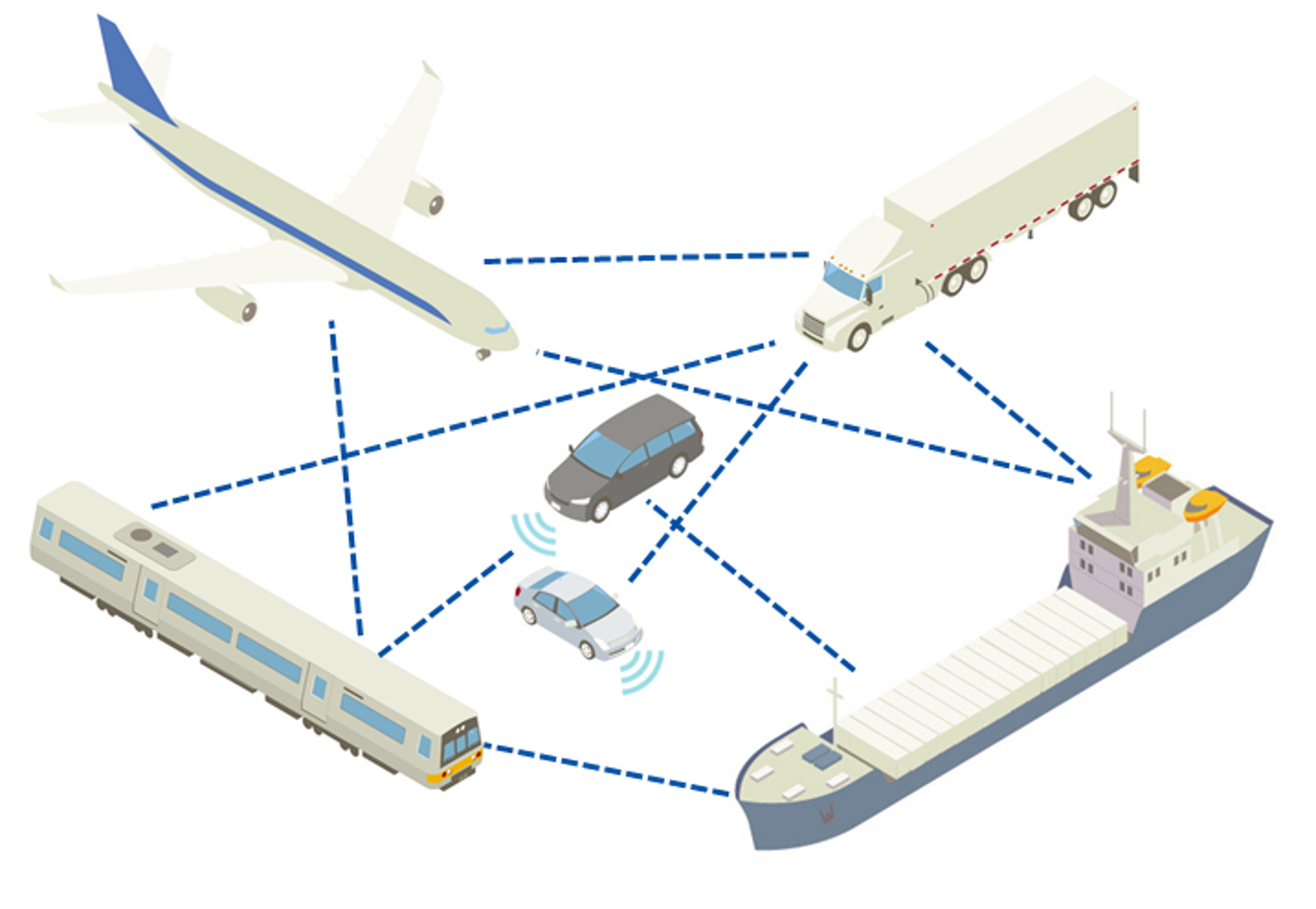A combination of EU policies and initiatives is key to unlocking the potential of mobility data, which is essential for the sector's digital and green transformation.
What is the potential of mobility data?
In today's interconnected world, the vast amount of data generated by the daily movements of people and goods holds high potential. Mobility data is a powerful driver for enhanced innovation and efficiency, for reduced environmental impact and improved quality of life for all Europeans. Leveraging this data can lead to smarter, more resilient, planning of transport infrastructure and services, more fluid traffic, easier cross-border trips, more competitive logistics chains and simpler reporting by SMEs. Beyond simply collecting data, the challenge is to make it easier to share, in a safe and controlled manner, and to transform it into actionable intelligence. Exploiting the untapped potential of transport data is crucial to support the development of AI and other frontier technologies.
Key initiatives and legislative frameworks
Several key initiatives and legislatives frameworks have been established to facilitate and promote the use of data in the mobility sector.
The European Strategy for Data implemented in February 2020 aims to establish a single market for data, ensuring Europe’s competitiveness at a global stage. It is a comprehensive plan to facilitate the access, sharing and use of data in all sectors, including mobility, harnessing its potential for the benefit of the economy and society while ensuring privacy data sovereignty.
Under this Strategy, the adoption of the European Data Act will ensure a fair allocation of value from data and foster data access and use. In the mobility sector, it will for example open the market for services based on vehicle data, from repairs to insurance. The implementing act on high-value datasets makes important public-sector datasets freely available in machine-readable format, including datasets on transport networks (inland waterways). Finally, the Data Governance Act aims to increase trust in data intermediaries and strengthen data-sharing mechanisms.
In her political guidelines for 2024-2029, Commission President Ursula von der Leyen, announced that the Commission will put forward a European Data Union Strategy, to simplify and streamline the framework for businesses and administrations to share data, drawing on existing rules.

Initiatives for digitalisation and data sharing in the field of transport
The EU is also actively fostering collaboration with governments and the industry to develop common standards and best practices for data collection, management, and use in the transport sector. Several initiatives support the digitalisation of transport, making it easier to access and exchange mobility-related data. Examples include the Intelligent Transport Systems (ITS) framework, which organises the access to essential transport data through National Access Points (NAPs) and the NAPCORE project, which aims to harmonise and enhance these access points across Europe. The Digital Transport and Logistics Forum (DTLF) creates interoperable environments for data sharing for freight and logistics. Additionally, Connecting Europe Facility (CEF) Digital supports the establishment of Operational Digital Platforms (ODPs), which will support the retrofitting of energy and transport infrastructure and provide ICT resources to facilitate the flow, storage, and processing of data, helping to develop new smart services.

Towards a common European mobility data space

The EU Data Strategy announced the creation of common European data spaces in key sectors, including mobility. These data spaces provide the governance and infrastructure necessary to facilitate the access to, pooling and sharing of data in a controlled and secure way.
While a lot of data is generated in the mobility and transport sector, it is highly fragmented. Too many companies struggle to get access to the data they need, while large foreign tech companies use European data to fuel their business.
The European Mobility Data Space (EMDS) aims to provide a common technical and governance framework to enable interoperability and remove barriers to data access and sharing in the mobility and transport sector. It builds on existing and emerging transport data ecosystems, helping to federate and interlink them. It supports businesses and governments by helping them to use data effectively, driving advancements in transportation technologies and services.
Actions to achieve the common European mobility data space
The Commission Communication on the creation of a common European mobility data space announced the objectives, supporting measures, milestones and a proposed way forward for the EMDS. To realise the vision of a common European Mobility Data Space (EMDS), several coordinated actions are underway.
Under the Digital Europe Programme (DIGITAL), a preparatory action was completed in September 2023 and mapped existing initiatives and identified potential common building blocks. A deployment action started in November 2023 to make available data infrastructure and governance mechanisms supporting use cases in nine cities and regions, focused on urban mobility, such as multimodal route planning, monitoring environmental impacts of traffic or making transport modes more accessible to people with reduced mobility. A new action has allocated EUR 15 million to establish a sustainable collaboration structure and deploy further cross-border mobility and logistics use cases.
Under the Connecting Europe Facility (CEF), an ongoing study will help to define the governance structure for the EMDS, and the role of the interlinking layer that will facilitate the discoverability and accessibility of data across different ecosystems.
Finally, the European Digital Infrastructure Consortia (EDIC) are a new mechanism to implement Multi-Country Projects, established by the Digital Decade Policy Programme 2030, designed to facilitate the deployment of sustainable infrastructure. The ongoing preparation of the Mobility and Logistic Data EDIC could play a major role in in the creation, scaling up and long-term viability of the EMDS.
Building on data ecosystems and platforms across the EU
In addition to these EU initiatives, various data ecosystems, initiatives platforms and marketplaces – driven by Member States or private actors – seek to facilitate data sharing in the mobility sector. Key examples include:
-
Mobility Data Space: supported by the German government, this open decentralised ecosystem allows for mobility data providers to share data while keeping control and linking existing mobility data platforms.
-
Eona-X: this data space for mobility, transport and tourism was founded by leading private actors including airline, railway, airport, automotive and travel technology companies. Part of the GAIA-X initiative, it aims to provide a seamless integration of travel data across various transport modes to enhance travel experience.
-
Basic Data Infrastructure (BDI): this set of agreements aimed at the logistics sector allows participating parties to jointly develop an IT network supporting the sharing of confidential data while ensuring data sovereignty. Its development and application are supported by the Dutch government.
-
Traffic Data Ecosystem: this public-private partnership involving around 200 organisations from Finland and beyond, developpes rules for effectively sharing data in the traffic domain to create innovative data-use solutions and a fair data economy. It is supported by Fintraffic.
The common European mobility data space will build on the multiple existing initiatives. It will promote interoperability between them, by contributing tools to support their convergence, and facilitate data discovery and access across ecosystems.
Promoting interoperability across sectors
Levering the synergies with other common European data spaces (such as tourism, smart communities, Green Deal and manufacturing) is essential, as some of the most promising opportunities lie at the junction between sectors. For example, taking advantage of the energy and mobility data spaces will make it be possible to exploit electro-mobility data, optimising energy production and demand.
To enable the interoperability across sectoral data spaces, the EU is supporting the development of a common blueprint, shared standards and common building blocks. The Digital Europe Programme is notably funding the Data Spaces Support Centre and the development of Simpl, the open-source smart middleware for European data spaces.
Learn More
-
The Sustainable and Smart Mobility Strategy webpage for sectoral initiatives and measures linked to mobility data
Latest news
Related Content
Big Picture




